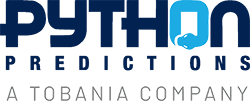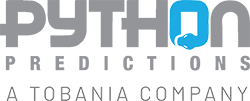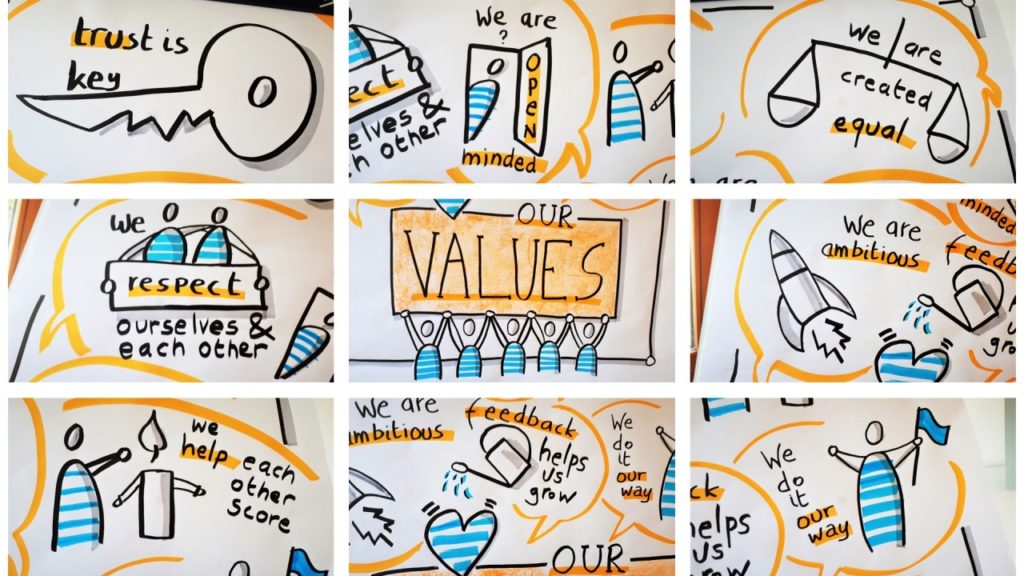
Yes, we have a long list of requirements for considering new hires. An ideal new recruit in our team has a passion for analytics, knowledge of algorithms or data platforms and pipelines, knows a couple of coding languages, has learned how to visualize the numbers and tell a story based on data, is interested in understanding and solving business challenges, is a great communicator and perhaps even a good project manager. To top it off, that person is able to work autonomously while being a great team player, is critical on the output produced, is creative and – increasingly important – is versatile, eager to adapt to new technology.
*Sigh* Consider the challenge of finding the right person given our wish list. However, it is not uncommon that we compromise when one of those requirements is not (fully) met.
But we never, ever compromise on values
So what are values? When the team was small, life was easy. We had a very solid but unarticulated shared understanding of what behavior was welcome and beneficial. And what behavior we wanted to avoid. In sum, we had a very strong yet implicit company culture, and we did not use the word ‘values’ at the time.
By the end of 2016, we wanted to grow beyond our team of 8 but feared losing our identity in that process. Almost three years later, the fear proved to be unfounded. We just needed to make our values explicit. And so we sat together and started to describe what we really liked about our culture. 60 minutes later, our values were distilled. Here they are:

Trust is key
We’re hired by clients to analyze their problems and advise them on the results and implications. If our clients do not trust the output or the data expert, the project is without value. As such, being trustworthy is very much related to the DNA of a good data professional. Our focus on being trustworthy is linked to being reliable, honest and transparent, both towards each other, and towards clients and partners.

We are open-minded
It is crucial to enter a project with an open mind – it makes no sense to perform an analysis if you already know which answer you want in the end. This again is a key trait of a good data expert, so it has always been naturally present in our team. In case of doubt, we keep an open mind and run an experiment.
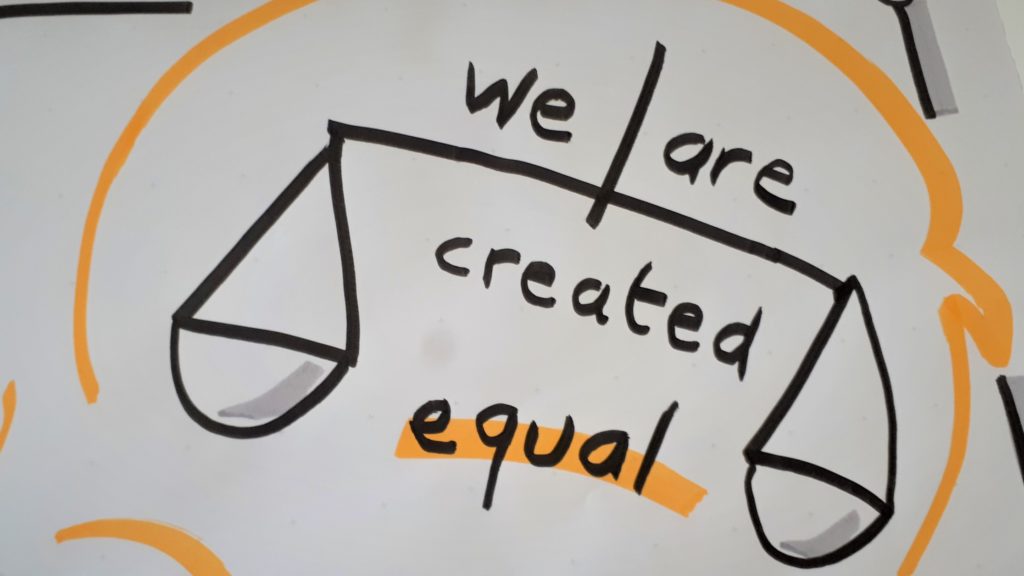
We are created equal
We value great ideas over status or position. Very often, a junior member at the team meeting has a fantastic idea that others did not consider. In a team consisting of clever people, there’s not much need for hierarchy, and we can go for the best idea regardless of internal politics or status.
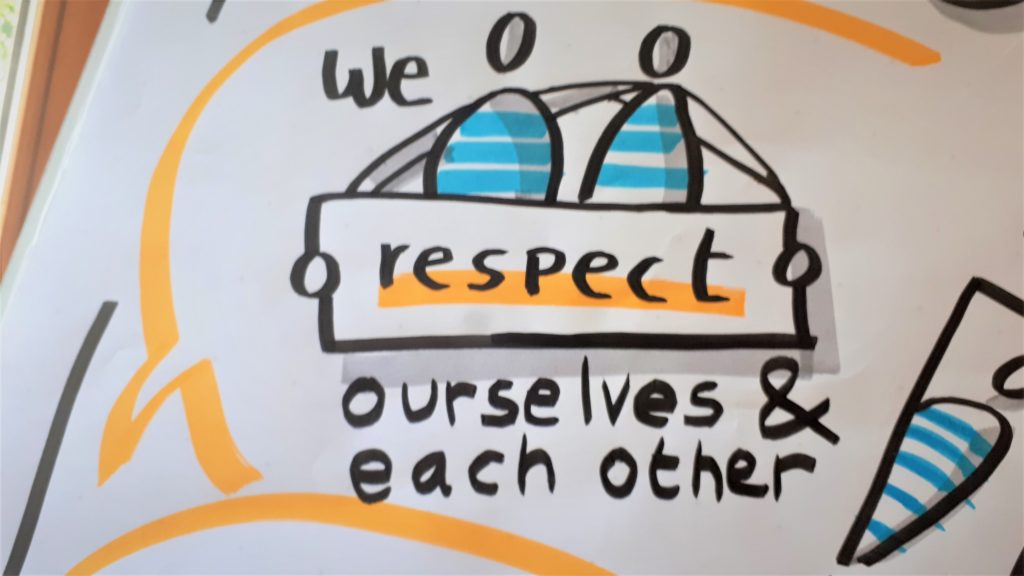
We respect ourselves and others
In our increasingly demanding world, it is important to set clear boundaries on our work/life balance. We stimulate the fact that none of us is working 24/7, so we try not to send each other slides for review the night before the presentation. We take time to lunch together and discuss other matters than work. We let colleagues enjoy their holidays without interruption. We organize our team meetings on Fridays, not on Thursday evenings. And our team building activities are during the work week, during the day.
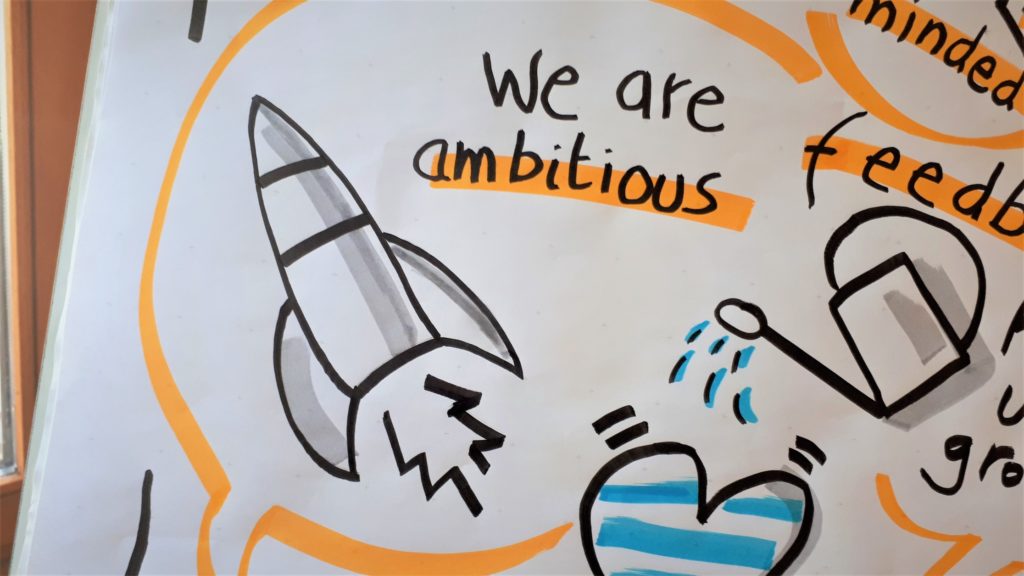
We are ambitious
Within the limits of our work/life balance, we have a healthy ambition to work on challenging projects. We challenge ourselves and others to grow (see feedback, later). While being realistic and pragmatic, we aim to ‘dream bigger’.
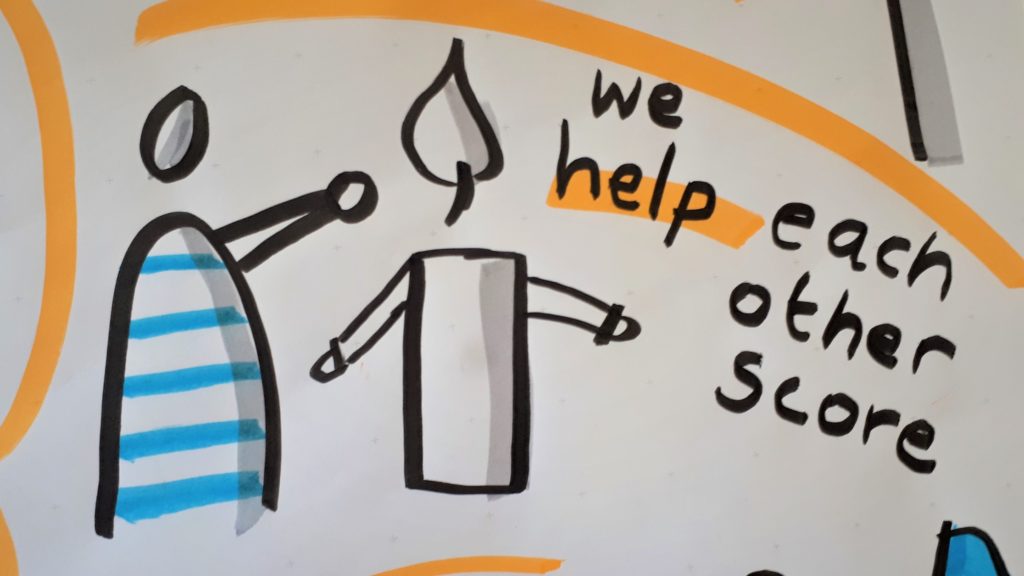
We help each other score
We help colleagues and clients to shine. Everyone in the team has one or more specific roles and likes to perform well in those roles. Data experts try to deliver the best possible output, project managers try to guide them and help out with customer contact. Our talent manager tries to build the strongest team possible by spotting and retaining talent. And management aims at creating an environment where everyone feels genuinely appreciated. We understand each other’s roles and offer help to let others succeed. And in the long run, we realize it is even more important that our clients score with our work, than that we do.
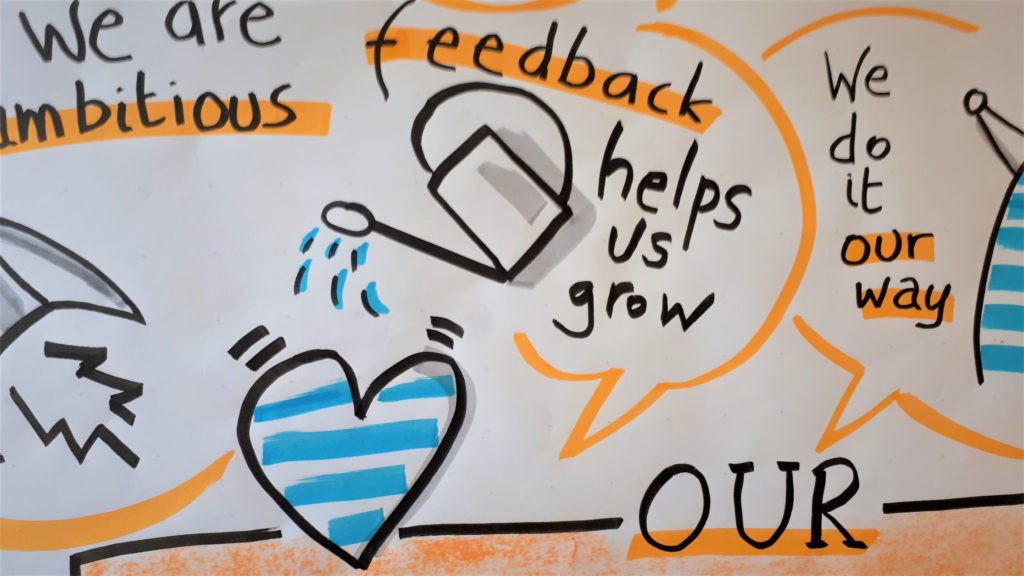
We value feedback
Without a doubt, our feedback culture is most fundamental to our way of working. We spend a lot of time providing feedback to each other, both formally and informally. Everyone provides feedback to everyone, management included. Positive feedback gives energy, recognition and involvement. Issues have the potential of allowing people to grow and learn from the moment. We do this with full transparency (and avoid masks, fake feedback or gossip). Through feedback we all grow, and we provide feedback to allow our colleagues to grow.
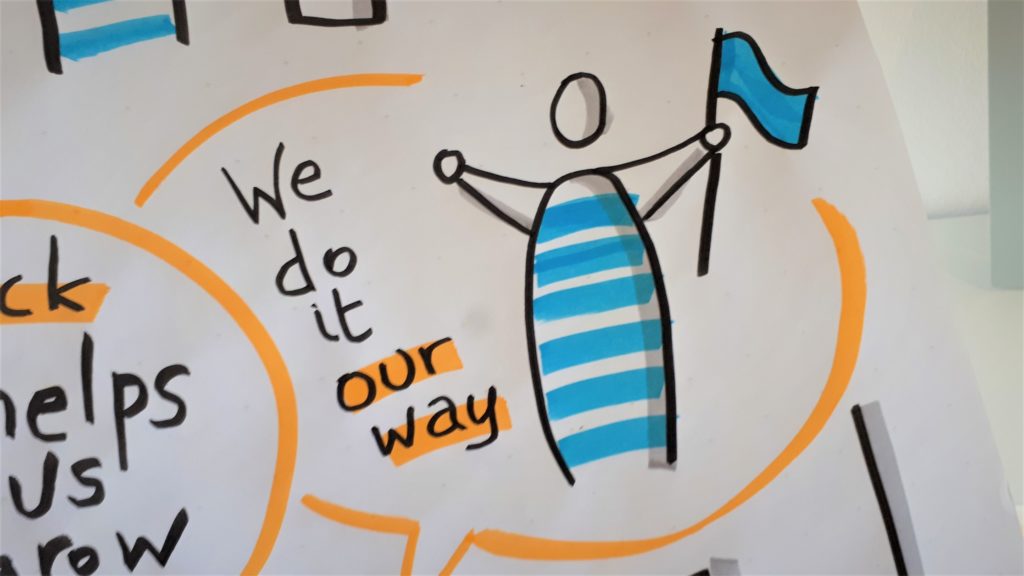
We do it our way
In all decisions we make in our team, we’re not interested in copying others. Instead, we try to do what makes sense for our team, which makes us a little different. And that’s ok.
So why bother?
Yes, we spend a lot of time talking about values, referring to them in discussions, enforcing them through jokes, etc. We put the effort into building and maintaining this solid, transparent joint understanding of the type of work environment we like to be a part of. We remind ourselves and others regularly about what matters. So where’s the proof that this works?
Last summer, as a team lead, I went through a difficult professional moment. While everything was going ok-ish, I did not feel recognized for my contributions to the team and had the impression I was personally no longer moving forward. At that same moment when I was losing my energy, three seniors in our team stepped up and asked if they could talk. They noticed my energy was down, and openly discussed the negative impact this could have on the team and expressed their concern for the future. In many other companies, this action would probably be considered too risky. In our culture, it was clear that this was the path forward.
They trusted me to accept their feedback and respect their ideas. They could expect me to be open-minded and ambitious. They trusted that I would be able to move forward with their feedback. And they wanted to help me grow.
It is with great pride and gratefulness that I look back at this moment. I started a personal journey on what motivated me, and being more actively engaged with new clients was a major part of the solution. Without any doubt, while we have our volume of customer successes, I consider our company culture the greatest accomplishment our team has reached yet.
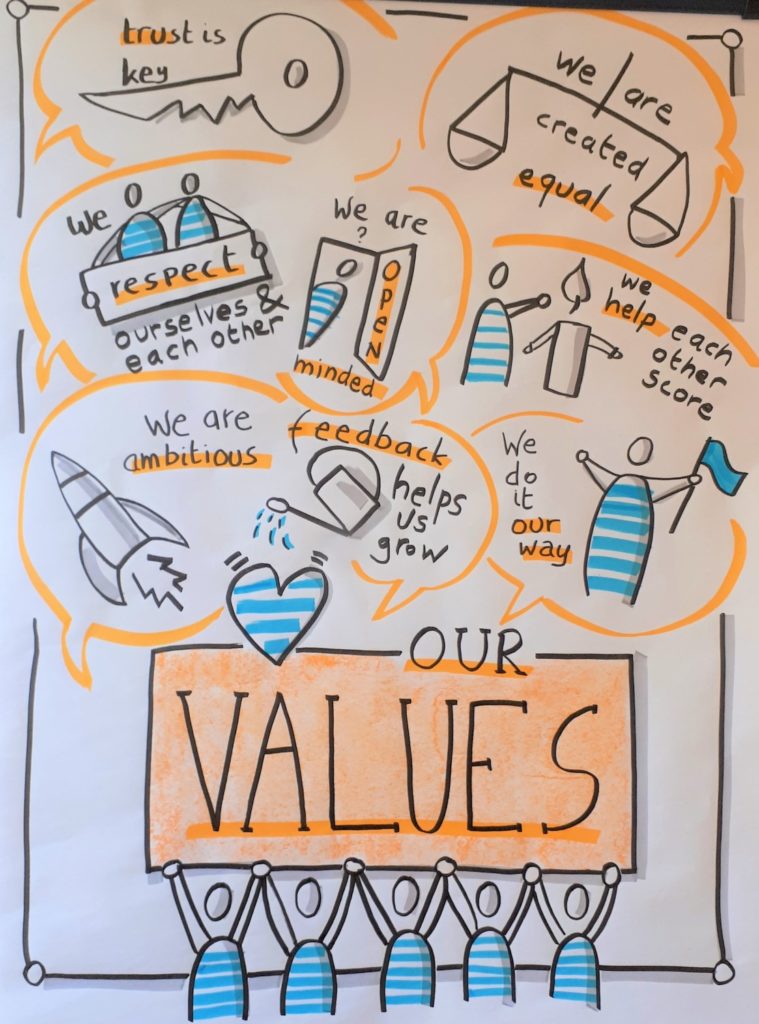
Eternal gratitude to Nele Verbiest, Jan Muermans and Pieter Van Bouwel for expressing their concerns in the summer of 2018.
Interested in joining our team? We’re currently hiring, see details about our current vacancy here or subscribe to our Talent Pool newsletter to receive immediate notifications of future new job opportunities at Python Predictions.
